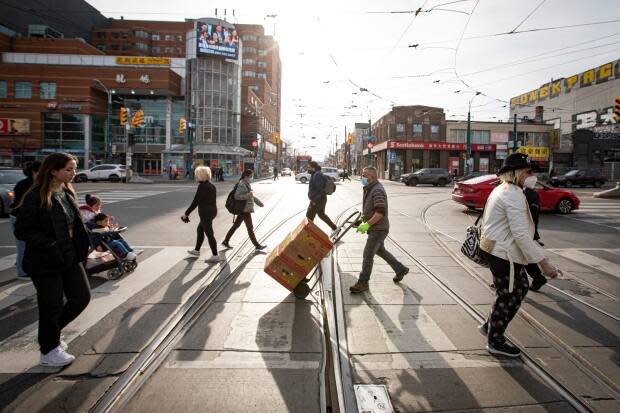Canada is losing the race between vaccines and variants as the 3rd wave worsens

Much of Canada is in the grips of a worsening third wave as COVID-19 vaccinations slowly ramp up, and experts say the spread of more contagious coronavirus variants is throwing gasoline on an already-raging fire.
"We have a lot of virus moving around the country and escalating very, very quickly," said Jason Kindrachuk, an assistant professor of viral pathogenesis at the University of Manitoba and Canada Research Chair of emerging viruses.
"Vaccinations are certainly starting to pick up, but we're nowhere near where we need to be to get this thing under control."
More than 15,000 cases of the more transmissible and potentially more deadly variants have been reported across Canada to date, with more than 90 per cent of those being the B117 variant first identified in the United Kingdom.
But the P1 variant first discovered in Brazil is also on the rise in Canada, with cases doubling in the past week to close to 1,000 — mostly in British Columbia, Ontario and Alberta.
And the B1351 variant first found in South Africa is also picking up steam, with over 150 cases identified in Quebec, more than 70 in Ontario and over 50 in B.C. as of Tuesday.
But experts say Canada's slow vaccine roll out has failed to keep up with the exponential rise in variants in the third wave and the premature loosening of restrictions has led to an increase in hospitalizations and deaths — even in younger Canadians.
WATCH | Variant first found in Brazil newest COVID-19 challenge in B.C.:
"People were hoping that we could get to the finish line and get everyone vaccinated without having to deal with another wave and unfortunately that doesn't seem to be the case," said Dr. Leyla Asadi, an infectious diseases physician at the University of Alberta in Edmonton.
"That's a combination of both our reopening too quickly and now you add in these variants of concern."
Canada has emerged as one of the only countries in the world with significant outbreaks of three different variants occurring at the same time — turning us into a giant experiment on the world stage.
"There's no other country that's kind of dealing with it as we are — we have all of them emerging at once," said Dr. Zain Chagla, an infectious diseases physician at St. Joseph's Healthcare Hamilton.
"What happens to all three of them in the mix? Which one takes over? Which one is the fittest of the three?"

Variants could threaten vaccine effectiveness
Canada's Chief Public Health Officer Dr. Theresa Tam says another unanswered question that has huge implications for our ability to control the third wave is whether variants like P1 pose a threat to COVID-19 vaccine effectiveness.
"This virus might be capable of evading the immune response," she said. "But we do not have an actual vaccine effectiveness estimate that is solidified."
Tam says she has asked medical officers of health across the country to gather more information on vaccine effectiveness against P1 in particular, while encouraging Canadians to get vaccinated and provinces and territories to keep public health restrictions in place.
Amid that black hole of data, Tam says Canada may be able to fill the international research void due to our surging rates of variant cases — for better or worse.
"We don't have enough information from other countries, including Brazil, about how well these vaccines work against P1," she said. "If Canada is seeing the evolution of spread of P1, we might be a country where we will be able to produce some of this data."
Tam says scientists believe one specific mutation common to all three variants, called E484K, could actually allow the virus to escape the immune response and even make it possible for someone who has previously had COVID-19 to become reinfected.

"That was the initial event that caused us to be concerned about this P1," she said. "There was reinfection in a particular person that already had COVID-19 before."
Tam said while there have so far only been laboratory studies done on the antibody response to P1 that showed in some cases there was a reduced ability for a vaccinated person's antibodies to neutralize P1 — the evidence so far is still a "signal of concern."
Officials warn against travelling within Canada
Health officials are imploring Canadians to avoid recreational travel within Canada as the third wave rages, but experts say stricter travel restrictions may not be enough now to prevent widespread outbreaks of more contagious coronavirus variants.
"Variants of concern are posing new challenges in different locations across the country. Now is not the time to travel for recreational purposes," Tam said Tuesday. "Limit your travel to essential trips only and do your part to stop the spread."
Deputy Chief Public Health Officer Dr. Howard Njoo said individuals need to take "personal responsibility to the extent that it's possible."
"Stay at home as much as possible, don't have any sort of non-essential travel — especially vacations going from one province to another."
Alberta is reinstating strict restrictions at a time when variants are surging, with a total of 676 announced Tuesday making up more than 40 per cent of the province's active COVID-19 cases.
WATCH | Alberta renews restrictions as communities battle P1 variant outbreaks:
Officials there are also investigating several major P1 outbreaks at large workplaces, at least one of which is tied to a traveller returning to Alberta from out of province.
"Even before the variants have taken hold, we could have been far more responsive. But we weren't and now we're in a situation where we have these variants that are far more transmissible," said Asadi.
"We have to take far more strict measures than previously, at least for a while until we can get the vaccination rates up."
Manitoba is the only province or territory outside of Atlantic Canada and the North to implement strict regional travel restrictions, requiring a mandatory 14-day quarantine for all travellers, and has so far avoided a third wave.
"Manitoba implemented it when they saw the variants and the rest of us just didn't," said Asadi.
"There's just this reluctance to do anything that seems too drastic, whereas doing the same old things results fundamentally in then having to institute stay at home orders, which themselves are really quite drastic but become necessary once you lose control."

Ontario announced sweeping restrictions and a stay at home order on Wednesday due to a surge in cases and overwhelming pressure on the healthcare system, but stopped short of regional travel restrictions to slow the spread of variants.
Ashleigh Tuite, an infectious disease epidemiologist and assistant professor at the University of Toronto's Dalla Lana School of Public Health, says variants already make up close to 70 per cent of Ontario's COVID-19 cases.
"It's incredibly widespread, so I think there's merit in restricting movement between areas," she said. "But as a way to control the spread of variants? That ship has likely already sailed."
Kindrachuk said Manitoba's travel restrictions have been a key part of their ability to control the spread of variants in the third wave, but a recent spike in cases and variants locally could jeopardize that.
"Once they get in, they start circulating a little bit under the radar, and then they start to take off," he said.
"Now what we're seeing is really it's raging in basically all the provinces with the exception of the Atlantic provinces, Manitoba, and the Territories. The question is going to be now, how long can it be maintained?"

